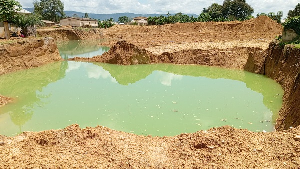Correspondence from Michael Oberteye, Eastern Region
Some communities along the Accra-Kumasi highway are under siege from illegal mining activities. The worst affected appears to be the stretch between Osino and Anyinam in the Eastern Region, with brazen mining ongoing across both sides of the highway.
Passengers travelling from either side watch in disbelief through their windows as dirt-bathed young men operate all manner of mining equipment just a few metres from the edge of the road in a desperate and unlawful bid to extract gold from the earth.
It appears the blatant nature in which some illegal miners ply their trade is more worrying than many assumed.
As illegal mining continues to spread like wildfire in the resource-rich West African state, miners continue to dig on a massive scale in forests and farms, degrading land and polluting rivers.
The mining has led to the felling of trees and the clearing of vast areas of forest vegetation. Excavators are then used to dig out the topsoil and subsoil.
GhanaWeb’s Eastern Regional Correspondent, Michael Oberteye, on his way to Anyinam to assess the situation, watched in amazement as the sounds of changfans echoed through the bushes.
At Anyinam, illegal miners in wellington boots roamed the community close to the mining sites. Backyards and compounds of residents are being pummeled by miners for gold while the government publicly touts its unwavering commitment to fight the canker.
The visit uncovered that miners were digging into the homes of aggrieved residents in search of the precious mineral.
Several huge pits have been dug close to various houses in the community, with the pits left uncovered in compound houses and backyards. In one situation, witnesses say, owners of four adjoining homes voluntarily sold their properties to the miners, who pulled down the structures in search of gold. What is left of the place is a huge pit partly filled with greenish water.
In one of the affected households, members disclosed to GhanaWeb that the landlord sold the compound of his house to the miners. Though refusing to speak on record, they provided a video recording of a heated confrontation between them, the landlord, and the galamseyers over the destruction.
The tenants, who have been forced to relocate from the compound as a result of the situation, say they are yet to find alternative accommodation.
The Anyinamhene, Osabarima Okogyeabusua Banning Duodo, when contacted by GhanaWeb at his palace on the situation, said that though indigenous small-scale mining had existed long ago, modern methods of the illegal activity—including the use of excavators and other sophisticated equipment—began over the past decade.
“Mining of our lands started over ten years ago when excavators came in with a large clearance and taking of and destruction of properties.”
According to him, it was difficult to differentiate between legal and illegal miners, as all prospective miners to the community showed documents to back their activities.
He said, “you’ll be in your farm and they’ll come and meet you there [and] tell you that this area has been demarcated for him to mine, so sometimes when you talk about illegal, sometimes you don’t know the difference between the illegal and legal because all those who came were holding papers.”
He expressed regret about the devastating effects of the menace on the environment, averring that the actors refused to cover the pits following their activities.
The traditional leader further explained that farming activities have reduced in the community due to the menace.
Asked how the government can liaise with chiefs to solve the problem, the traditional leader, while expressing disappointment in chiefs being sidelined during the granting of concessions to miners, noted that there was a need for government collaboration.
“The way forward will be a great collaboration between the government and the chiefs and the miners,” asserted Osabarima Okogyeabusua Banning Duodo, positing that enforcement measures should be put in place to ensure that the miners reclaim the lands after their activities.
Kofi Adams, a former driver, identified himself as a galamseyer. According to him, he opted for the illegal trade after realizing that his profession wasn’t financially rewarding enough.
Describing the illegal mining activity as lucrative, the unrepentant miner said the activity, which he has been involved in for the past ten years, has enabled him to put up a three-bedroom apartment and made life comfortable for his family.
Following the government’s renewed fight against illegal mining in recent times, Kofi says he has been rendered unemployed in the process and is currently without any source of livelihood.
Though he admitted that their activities destroyed the country’s water bodies, he nevertheless argued that ending illegal mining would render most youth unemployed and lead to a subsequent rise in crime. He asserted, “ending galamsey would result in rise in theft cases, how would the foreigners involved go back to their countries?” To address the problem, he called for the legitimization of galamsey as a recognised source of income to be conducted in an appropriate manner.
A resident, who gave her name as Akos, condemned the illegal mining activities and the massive destruction of the environment.
Arguing that the activities were driven by a lack of employment opportunities, she tasked the government to provide alternative sources of income to dissuade the youth from opting for the illegality.
Regional News of Wednesday, 4 December 2024
Source: www.ghanaweb.com













